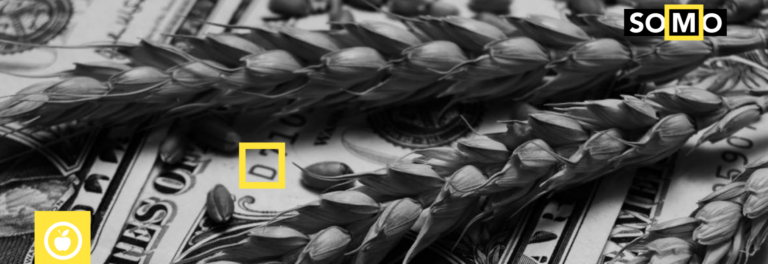
The Netherlands misses chance for effective measures against food speculation
The Netherlands appears unwilling to take strict measures on a European level against market-distorting speculation with respect to food prices and other commodities. Mr Dijsselbloem, the Dutch Finance Minister, is ignoring the wishes of the Dutch House of Representatives and Members of the European Parliament. ‘If excessive speculation continues to be possible, continual price fluctuations may cause upheaval in the lives of farmers and consumers across the world,’ states Myriam Vander Stichele, senior researcher for SOMO.
The revision of a European Union law, the Markets in Financial Instruments Directive (MiFID), will determine if European markets for food commodity derivatives (futures) will lead to stable prices for farmers and food importing countries. The decision process regarding this revision of law is reaching its final stage.
The European Parliament and the Council of Ministers have given their separate responses to the proposals of the European Commission. These three parties (the so-called Trilogue) have been meeting since July to write the final law text (MiFID-2) and on 4 September2013 they addressed the regulation of the futures market.
Quick profits for investors
Vander Stichele explains: ‘On the commodity futures exchanges, farmers or end users such as Unilever are no longer the dominant party but have been outnumbered by big banks, investors and other large financial players. These parties are trying to make quick profits off commodity derivatives. Their abrupt moves on and off the exchange market have a negative influence on the stability of food and other commodity prices, as demonstrated clearly in the past two years. Radical fluctuations in these food prices jeopardise the income of farmers and the food security of the poor in developing countries, especially food importing countries.’
Measures need to be taken at a European level
A legal restriction on the scope and number of futures contracts in hands of financial players, also called position limits, are expected to prevent this risk. The European Parliament, NGOs and SOMO want to determine position limits, via MiFID-2, at a European level. The Dutch House of Representatives also is in favour of this(opens in new window) , referring to the American model.
Vander Stichele: ‘Nevertheless, Dijsselbloem and the his peers in the European Council of Finance Ministers are trying to arrange for setting the position limits to be done by national supervisors. But Europe is a single market. If you do not determine position limits at a central European level, some countries will be able to gain advantages for their own futures markets and dealers by allowing more numerous contracts, while ‘good’ countries with stricter regulation will be considered less competitive and have less derivatives business .’
‘If Dijsselbloem and his peers get their way, regulation will simply not be effective. Excessive speculation and large price fluctuations will continue to occur, along with all the damage it wreaks on food security in poor countries and food production worldwide.’
Loopholes
The provisional drafts of the Ministers and of the European Parliament, moreover, offer other loopholes that will cancel out any possible good achieved by regulation(opens in new window) , through an assortment of exceptions and exempting so-called over-the-counter (OTC) trading. NGOs recently indicated ways(opens in new window) to close these loopholes in the draft law and organised a protest in Brussels on 4 September(opens in new window) to add force to their arguments for effective regulation.
Hazardous for pension funds
The huge price fluctuations and speculation activities allow investors to take big economic risks. Vander Stichele is very surprised at the letter(opens in new window) Minister Dijsselbloem wrote to the House of Representatives and pension funds in May 2013, in which he basically gives banks and pension funds carte blanche to speculate in commodity and derivatives markets. In this letter to the House, the minister makes no mention of the fact that the market is dominated by speculators, or of other risks.
Vander Stichele illustrates the risks: ‘Pension fund Zorg & Welzijn invested invested 7% (opens in new window) – approx. €9.3 billion – of its portfolio in 2012 in speculative commodity derivatives. In doing so, the fund obtained a return of 0.8% compared to an average of 13.4%. In other words, speculation in commodity prices is a risky investment. If many large-scale players as a group lose confidence in commodity derivates and therefore pull out of the futures markets, or conversely, if they would start speculating en masse, prices become volatile.’
Sustainable investment in agricultural production
The call for investments to help the Netherlands snap out of its economic slump is heard everywhere.
‘Pension funds could also invest in direct production, such as sustainable agriculture. That would make a contribution to more stable prices and better economic survival rates for farmers.’
However, the trend is moving the other way, as Vander Stichele observed again recently.
‘Take the Deutsche Bank. It is very active with (food) commodity funds and on food futures markets, which it explains as its willingness to keep investing in agriculture. However, as of April 2013, tens of thousands of Dutch farmers were told by Deutsche Bank(opens in new window) it will no longer service them after they became customers in 2010 because the Deutsche Bank took over part of ABN/AMRO.’
Lobby against regulation
European politicians are put under great pressure by the lobby of the financial sector and large enterprises who are against strict derivatives regulation.
Vander Stichele: ‘Opponents of position limits state that “liquidity” is required to help farmers protect themselves from unstable prices via futures markets. But why are the prices so unstable in the first place? It may be the result of bad agricultural policy, but nowadays it may also be due to insufficient investment in agriculture and to excessive speculation.’
More information
- Challenge to Regulators – SOMO publication
- Feeding the financial hype – SOMO publication
- Updated list of current academic research on commodity speculation(opens in new window)
- Commodity derivatives – blog by Benoît Lallemand of Finance Watch(opens in new window)
Do you need more information?
-

Myriam Vander Stichele
Senior Researcher
Related content
-
Financing Food Published on:
 Myriam Vander StichelePosted in category:Publication
Myriam Vander StichelePosted in category:Publication Myriam Vander Stichele
Myriam Vander Stichele
-
Challenges for Regulators Published on:
 Myriam Vander StichelePosted in category:Publication
Myriam Vander StichelePosted in category:Publication Myriam Vander Stichele
Myriam Vander Stichele
-


